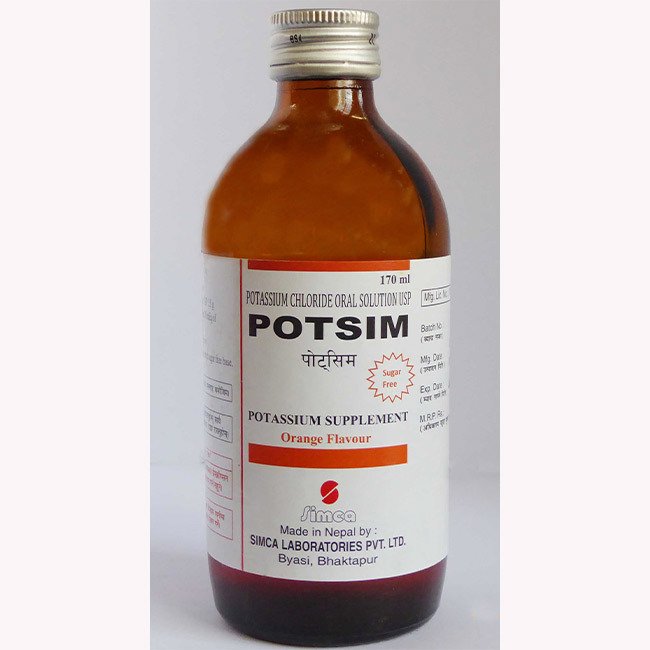Potsim
POTSIM
Generic composition: Potassium Chloride 1.5g equivalent to 20mEq of potassium ion
General Introduction
Potsim is Potassium Chloride solution used as a supplement for potassium loss, either to treat or prevent hypocalcaemia. Each 15 ml of POTSIM solution contains 20 mEq of potassium.
Therapeutic category
- Potassium supplement
Dosage forms available
- POTSIM 170ml bottle
Mechanism of Action
Absorption from GI to systemic circulation followed by active ion transport across cell.
Pharmacokinetics
Absorption from GI tract, eliminated via urine, under normal condition the amount of potassium absorbed is equal to the amount excreted in urine.
Uses
- Used as a potassium supplement during loss of potassium or potassium depletion.
Potassium depletion may be caused by
- Digitalis intoxication
- Diuretic therapy (Furosemide/thiazides)
- Diabetic ketoacidosis
- Hyper aldosteronism
- Patients on prolonged parenteral nutrition
- Starvation
- Excessive fluid loss- vomiting/diarrhea
- Corticosteroid therapy
- Hypochloremic alkalosis
Dose
Treatment of hypokalemia:
- Adult: Daily dose ranges from 40 to 100 mEq. Give in 2 to 5 divided doses: limit doses to 40 mEq per dose. The total daily dose should not exceed 200 mEq in a 24 hour period. Maintenance or Prophylaxis: Typical dose is 20 mEq per day. Individualize dose based upon serum potassium levels.
- Pediatric: patients aged birth to 16 years old: 2-4 mEq/kg/day in divided doses; not to exceed 1 mEq/kg as a single dose or 40 mEq. Maintenance dose: typical dose is 1 mEq/kg/day. Do not to exceed 3 mEq/kg/day.
Side effects
Hyperkalemia, nausea, vomiting, flatulence, abdominal pain, discomfort, diarrhea.
Drug Interaction
- Potassium-Sparing diuretics
- Angiotensin-Converting Enzyme Inhibitors
- Angiotensin Receptor Blockers
Contraindications
- Patients with hyperkalaemia are contraindicated to potassium supplements like POTSIM. Increased potassium may results in arrhythmia and ultimately cardiac arrest. Hyperkalemia may complicate chronic renal failure, systemic acidosis such as diabetic acidosis, acute dehydration, and extensive breakdown as in severe burns, adrenal insufficiency, or the administration of a potassium-sparing diuretic.
- Potassium chloride is contraindicated in patients with metabolic acidosis and hyperchloremia; other salts of potassium should be supplemented in the case.
Advantages
- The potassium chloride solution for oral use easily replenishes the deficient potassium in the body along with chloride. This will help with lesser side effects and controlled increase of K ions than IV administration


